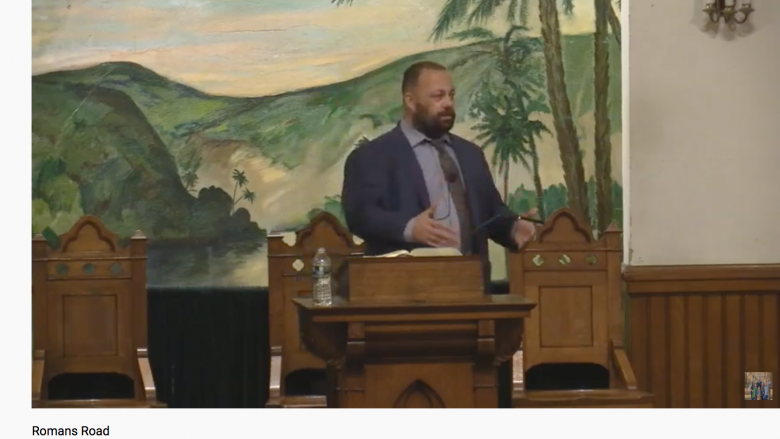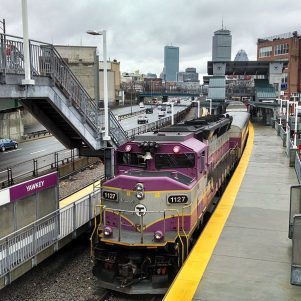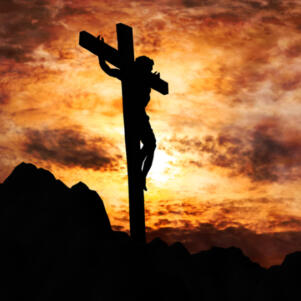Worcester Pastor Holds Less-Than-10-People Church Service, Hints At Statement To Come
By Matt McDonald | April 29, 2020, 23:20 EDT
 Pastor Kris Casey preaches during a service Wednesday, April 29, 2020 at Adams Square Baptist Church in Worcester, Massachusetts.
Pastor Kris Casey preaches during a service Wednesday, April 29, 2020 at Adams Square Baptist Church in Worcester, Massachusetts. A Worcester pastor under pressure held a church service Wednesday night for fewer than 10 people, keeping within the governor’s order limiting public gatherings, police said.
Pastor Kris Casey led his usual 7 p.m. Wednesday service, which was carried live on the YouTube channel of Adams Square Baptist Church.
“There was no violation because there were less than ten people,” Worcester police spokesman Kathleen Daly said in an email message to New Boston Post on Wednesday night.
Casey declined to comment directly on the situation while standing on the steps of the church Wednesday, April 29, according to video posted online by the Worcester Telegram & Gazette.
“On advice of my attorneys, I’m not making a statement tonight. Please stay tuned over the next few days. I will come out and I’ll make a statement. I’ll come out these doors and make a statement, and you will have the information you’re looking for,” Casey said.
Casey led a church service open to all comers that drew, by his count, 56 people on Sunday, April 26. That went against Massachusetts Governor Charlie Baker’s executive order of March 23 limiting most gatherings to 10 people or fewer, including what the order calls “faith-based events.”
The Sunday morning service drew one news outlet: New Boston Post. Wednesday night’s service drew a gaggle of television news cameras and reporters, but they weren’t allowed inside.
The governor has defended the order as a means of trying to prevent the spread of coronavirus, most recently during a press conference on Tuesday, April 28.
Casey sent the governor a letter last week stating his intention to hold a regular church service open to the public this past Sunday morning. In the letter he challenged the governor’s order, saying it violates freedom of religion as guaranteed by the state and federal constitutions. Casey also questioned how the governor can justify closing churches to most members of the public but not liquor stores.
Casey said he sent copies to the mayor and chief of police of Worcester, but he said no one contacted him saying not to go ahead.
On Sunday the church had volunteers checking the temperature of everyone who entered and offered masks, gloves, and hand sanitizer. Casey also asked people to maintain social distance and refrain from physical contact.
In response to the church service, Worcester’s city manager had the police chief hand deliver a letter to Casey on the afternoon of Monday, April 27 informing him that Sunday’s service violated the governor’s order and ordering him not to do it again.
Neither state nor local officials have said publicly what they would do if Casey holds another church service for more than 10 people.
During his sermon Wednesday, April 29, Casey focused on the need to trust God and to ask Jesus for salvation.
He did not mention the controversy over public church services directly, but he mentioned the strain he and his wife have experienced during the past several days.
“You know, the Bible tells us to love our enemies, and pray for them that spitefully abuse you,” Casey said. “Over the last couple of days, this has been an extremely difficult time, for this church, and for myself and our family. And there’s been a lot of people who have called and said a lot of nasty things. You know, my wife and I take the time and we pray, ‘Lord, help us to love them. We don’t know what who this person is or what they’re going through. But would you send someone their way that would tell them about Jesus? If they don’t want to listen to us, would you send someone their way so they can learn more about Jesus?’ ”
A dispute with a local mayor over whether churches in Louisville, Kentucky could hold drive-in church services in their parking lot led to a federal lawsuit and a judge issuing a temporary restraining order earlier this month against the mayor’s ban, which allowed the parking lot services to proceed.
In that case the judge, Justin R. Walker, a Trump appointee to the U.S. District Court of the Western District of Kentucky, questioned the mayor’s definition of essential and non-essential activities in ordering some places to close but allowing others to stay open. Like the Worcester pastor’s letter to Governor Baker, the Kentucky federal judge keyed in on liquor stores and whether they can be favored over churches.
“Those ‘essential’ activities,” Judge Walker wrote Saturday, April 11, the day before Easter, “include driving through a liquor store’s pick-up window, parking in a liquor store’s parking lot, or walking into a liquor store where other customers are shopping. The Court does not mean to impugn the perfectly legal business of selling alcohol, nor the legal and widely enjoyed activity of drinking it. But if beer is ‘essential,’ so is Easter.”
The Kentucky federal court decision does not apply to Massachusetts,
Formal disputes over parking lot church services have not surfaced in Massachusetts. Parking lot church services took place in at least five communities in the state on Easter Sunday.
The governor’s order limiting “faith-based events” to 10 people or fewer does not explicitly mention cases where people drive into a parking lot for a service and never leave their vehicle.
The Worcester case differs from those cases because the service this past Sunday was held inside a building where more than 10 people gathered together.











